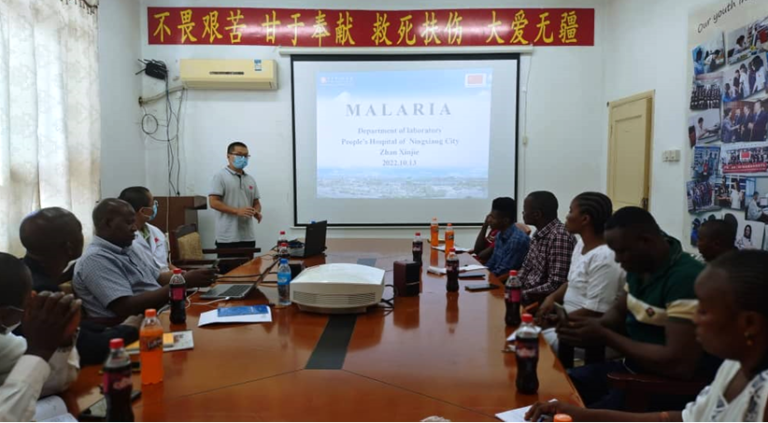By Abu Bakarr Kargbo
The 23rd batch of Chinese Doctors at the Sierra Leone – China Friendship Hospital at Jui in the Western Rural District of the country, has on Thursday 13th October 2022 provided local staff with laboratory training on malaria prevention and treatment. The training which took the form of a power-point presentation, video documentary, and practical work, was aimed at providing hospital staff with the required skills on how to perform modern day’s diagnoses of malaria.
A Laboratory Specialist of the Chinese Medical Team, Dr. Zhan Xinjie described malaria as a parasitic disease caused by the infection of the plasmodium parasite. “Malaria is a serious and sometimes life-threatening tropical disease that kills 445,000 people worldwide each year, many of them children in Africa,” he said and furthered that there are four kinds of plasmodium parasites in the human body, namely plasmodium vivax, plasmodium malaria, plasmodium falciparum, and plasmodium ovale. “Microscopic examination is the gold standard for malaria diagnosis,” he noted.
In China, Dr. Zhan said plasmodium falciparum is the main one. “The main manifestations of this disease are periodic chills, fever and fever withdrawal of sweating,” he revealed and furthered that “the source that infects this disease is malarial patient and malarial take insect person, transmission way basically includes the bite of the female anopheles mosquito, through blood transmission, and mother-to-child transmission.
Dr. Sallieu Kamara, Laboratory Lead at Sierra Leone – China Friendship Hospital thanked the Chinese Medical Team for putting together a comprehensive training package for the local staff. He said they have been using the old fashion way of diagnosing malaria, which is using rapid medical tests, noting that they are now happy to learn about microscopic technique, which is the gold standard.
Dr. Kamara remarked that although they have competent and trained staff to perform the practical diagnoses the hospital is however challenged with a lack of macroscopic machines. “We want the Chinese and the government of Sierra Leone to help us get at least two microscopic machines to enable us to have quality results in malaria diagnosis,” he said and continued that the hospital is committed to treating more patients and saving lives.













